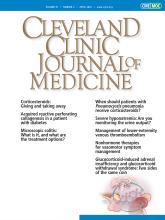ABSTRACT
Vasomotor symptoms (VMS) are associated with adverse health consequences and can cause significant morbidity for postmenopausal women. Although hormone therapy remains the gold standard of VMS treatment in menopausal women, some women have contraindications to or may choose not to take hormone therapy. This article provides an up-to-date overview of the current evidence-based nonhormone therapies available for managing VMS. Evidence supporting various treatment options is reviewed, including lifestyle interventions, mind-body therapies, procedures, pharmacologic agents, and emerging therapies, such as neurokinin-receptor antagonists. The efficacy, safety, and clinical use of these treatments are detailed, offering insights for clinicians to make informed decisions in menopausal VMS management.
- Copyright © 2024 The Cleveland Clinic Foundation. All Rights Reserved.
- Tara K. Iyer, MD, MSCP⇑
- Director, Menopause and Midlife Clinic, Division of Women’s Health, Department of Medicine, Brigham and Women’s Hospital, Boston, MA; Instructor of Medicine, Harvard Medical School, Boston, MA
- Address:
Tara K. Iyer, MD, MSCP, Division of Women’s Health, Department of Medicine, Brigham and Women’s Hospital, 1620 Tremont Street, 3rd Floor, Boston, MA 02120; tiyer{at}bwh.harvard.edu
- Alexa N. Fiffick, DO, MBS, MSCP
- Pelin Batur, MD, FACP, MSCP
ABSTRACT
Vasomotor symptoms (VMS) are associated with adverse health consequences and can cause significant morbidity for postmenopausal women. Although hormone therapy remains the gold standard of VMS treatment in menopausal women, some women have contraindications to or may choose not to take hormone therapy. This article provides an up-to-date overview of the current evidence-based nonhormone therapies available for managing VMS. Evidence supporting various treatment options is reviewed, including lifestyle interventions, mind-body therapies, procedures, pharmacologic agents, and emerging therapies, such as neurokinin-receptor antagonists. The efficacy, safety, and clinical use of these treatments are detailed, offering insights for clinicians to make informed decisions in menopausal VMS management.
- Copyright © 2024 The Cleveland Clinic Foundation. All Rights Reserved.






